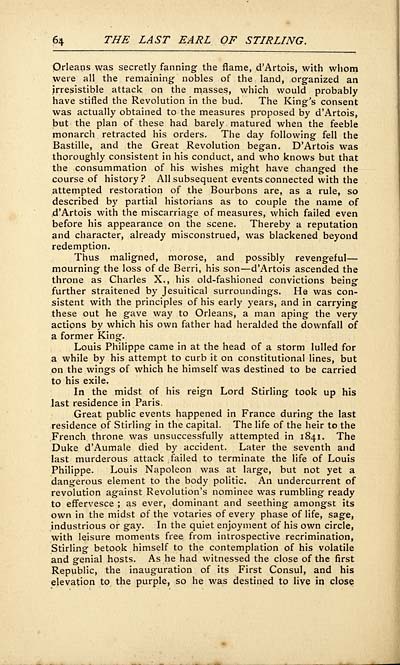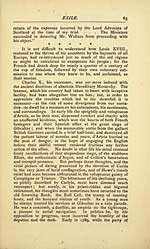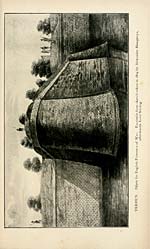Life of the last Earl of Stirling
(74) Page 64
Thumbnail gallery: Grid view | List view

64 THE LAST EARL OF STIRLING.
Orleans was secretly fanning the flame, d'Artois, with whom
were all the remaining nobles of the land, organized an
irresistible attack on the masses, which would probably
have stifled the Revolution in the bud. The King's consent
was actually obtained to the measures proposed by d'Artois,
but the plan of these had barely matured when the feeble
monarch retracted his orders. The day following fell the
Bastille, and the Great Revolution began. D'Artois was
thoroughly consistent in his conduct, and who knows but that
the consummation of his wishes might have changed the
course of history? All subsequent events connected with the
attempted restoration of the Bourbons are, as a rule, so
described by partial historians as to couple the name of
d'Artois with the miscarriage of measures, which failed even
before his appearance on the scene. Thereby a reputation
and character, already misconstrued, was blackened beyond
redemption.
Thus maligned, morose, and possibly revengeful —
mourning the loss of de Berri, his son — d'Artois ascended the
throne as Charles X., his old-fashioned convictions being
further straitened by Jesuitical surroundings. He was con-
sistent with the principles of his early years, and in carrying
these out he gave way to Orleans, a man aping the very
actions by which his own father had heralded the downfall of
a former King.
Louis Philippe came in at the head of a storm lulled for
a while by his attempt to curb it on constitutional lines, but
on the wings of which he himself was destined to be carried
to his exile.
In the midst of his reign Lord Stirling took up his
last residence in Paris.
Great public events happened in France during the last
residence of Stirling in the capital. The life of the heir to the
French throne was unsuccessfully attempted in 1841. The
Duke d'Aumale died by accident. Later the seventh and
last murderous attack failed to terminate the life of Louis
Philippe. Louis Napoleon was at large, but not yet a
dangerous element to the body politic. An undercurrent of
revolution against Revolution's nominee was rumbling ready
to effervesce ; as ever, dominant and seething amongst its
own in the midst of the votaries of every phase of life, sage,
industrious or gay. In the quiet enjoyment of his own circle,
with leisure moments free from introspective recrimination,
Stirling betook himself to the contemplation of his volatile
and genial hosts. As he had witnessed the close of the first
Republic, the inauguration of its First Consul, and his
elevation to the purple, so he was destined to live in close
Orleans was secretly fanning the flame, d'Artois, with whom
were all the remaining nobles of the land, organized an
irresistible attack on the masses, which would probably
have stifled the Revolution in the bud. The King's consent
was actually obtained to the measures proposed by d'Artois,
but the plan of these had barely matured when the feeble
monarch retracted his orders. The day following fell the
Bastille, and the Great Revolution began. D'Artois was
thoroughly consistent in his conduct, and who knows but that
the consummation of his wishes might have changed the
course of history? All subsequent events connected with the
attempted restoration of the Bourbons are, as a rule, so
described by partial historians as to couple the name of
d'Artois with the miscarriage of measures, which failed even
before his appearance on the scene. Thereby a reputation
and character, already misconstrued, was blackened beyond
redemption.
Thus maligned, morose, and possibly revengeful —
mourning the loss of de Berri, his son — d'Artois ascended the
throne as Charles X., his old-fashioned convictions being
further straitened by Jesuitical surroundings. He was con-
sistent with the principles of his early years, and in carrying
these out he gave way to Orleans, a man aping the very
actions by which his own father had heralded the downfall of
a former King.
Louis Philippe came in at the head of a storm lulled for
a while by his attempt to curb it on constitutional lines, but
on the wings of which he himself was destined to be carried
to his exile.
In the midst of his reign Lord Stirling took up his
last residence in Paris.
Great public events happened in France during the last
residence of Stirling in the capital. The life of the heir to the
French throne was unsuccessfully attempted in 1841. The
Duke d'Aumale died by accident. Later the seventh and
last murderous attack failed to terminate the life of Louis
Philippe. Louis Napoleon was at large, but not yet a
dangerous element to the body politic. An undercurrent of
revolution against Revolution's nominee was rumbling ready
to effervesce ; as ever, dominant and seething amongst its
own in the midst of the votaries of every phase of life, sage,
industrious or gay. In the quiet enjoyment of his own circle,
with leisure moments free from introspective recrimination,
Stirling betook himself to the contemplation of his volatile
and genial hosts. As he had witnessed the close of the first
Republic, the inauguration of its First Consul, and his
elevation to the purple, so he was destined to live in close
Set display mode to:
![]() Universal Viewer |
Universal Viewer | ![]() Mirador |
Large image | Transcription
Mirador |
Large image | Transcription
Images and transcriptions on this page, including medium image downloads, may be used under the Creative Commons Attribution 4.0 International Licence unless otherwise stated. ![]()
| Histories of Scottish families > Life of the last Earl of Stirling > (74) Page 64 |
|---|
| Permanent URL | https://digital.nls.uk/95601329 |
|---|
| Description | A selection of almost 400 printed items relating to the history of Scottish families, mostly dating from the 19th and early 20th centuries. Includes memoirs, genealogies and clan histories, with a few produced by emigrant families. The earliest family history goes back to AD 916. |
|---|

